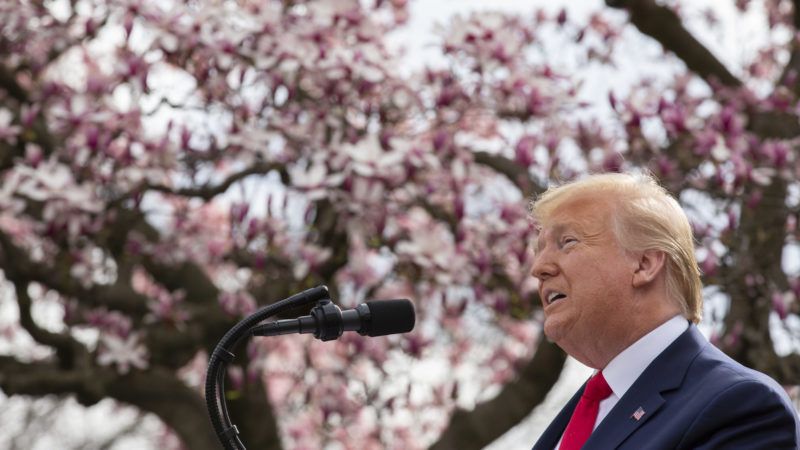Coronavirus Is Going To Be Expensive. Too Bad the Government Is Already in Massive Debt.
Having failed to be fiscally responsible when it would have been relatively easier, our elected officials will now likely hike spending even further.

While delivering an address Friday afternoon to declare a national emergency and outline plans for billions of dollars in emergency spending to combat the COVID-19 virus, President Donald Trump paused for a rare moment of reflection.
In addition to responding to the current coronavirus crisis, Trump said, the federal government would have to make changes to be better prepared for a similar event in the future. You hope that doesn't happen, he said, "but it will, I guess. Somewhere out there. [We've] had some bad ones over the years."
It's a shame he's three years too late in realizing that.
During Trump's first three years in office, he's signed off on spending plans that added at least $4.7 trillion to the national debt. The debt totals more than $23 trillion, a record high. When measured against the size of the economy, it is approaching the all-time record set during World War II. Annual budget deficits are expected to exceed $1 trillion for the rest of the decade, at least. The Government Accountability Office has called the nation's fiscal trajectory "unsustainable."
Trump said during the 2016 campaign that he'd be able to pay off the national debt in eight years. That was always a pretty laughable idea, but once in office, Trump was the one laughing off worries about overspending. "I won't be here" when the national debt becomes a crisis, Trump reportedly said during one Oval Office discussion about the issue.
But the "bad one" is here now. And Trump is still in office.
The bad ones aren't always pandemics. Sometimes they are wars or massive terrorist incidents. Sometimes they are the result of government-inflated housing bubbles popping. Sometimes they're just part of the business cycle. But they always come, and you can rarely predict them.
When they do happen, another thing you can count on is a governmental response that involves spending more money—to help people who lose jobs, to prop-up whole industries, or just to stimulate the stock market—at a time when tax revenues are almost certain to fall. Much of that spending will be counterproductive or, worse, wasteful cronyism. But it will happen regardless. This time, the Trump administration and House Democrats are currently negotiating a massive spending package (perhaps as much as $50 billion) that is likely to include paid sick leave for workers, expanded welfare programs, and a bailout for travel industries.
"The federal government will unleash every authority, resource, and tool at our disposal," Trump said Friday.
Trump's favored solution, a payroll tax cut that would extend through November, would reduce federal revenues by an estimated $840 billion.
The "bad ones," in other words, are a recipe for growing deficits. That was true during World War II and after 9/11. It was true during the Great Depression and the Great Recession. We can debate the merits of aggressive, expensive government response to crisis all day, but the more important lesson provided by all those previous historical examples is to be prepared for them. That means keeping deficits in check—or, goodness, could we dream of eliminating them entirely?
The past decade was a good opportunity to do that. Great, even. Since the last recession officially ended in the third quarter of 2009, the United States enjoyed 42 consecutive quarters of solid if unspectacular economic growth through the end of 2019. That's the longest run of uninterrupted growth since government economists began tracking the business cycle in the 1850s, far outpacing the average economic expansion of 18 months. Employment has increased by 12 percent, the jobless rate reached record lows, and America's gross domestic product (GDP) has increased by more than 25 percent.
It's too soon to say for sure, but that winning streak appears to be at an end. How did we handle that decade of good times? Mostly by pretending the "bad ones" would never come. Here's what I wrote in January:
Hanging over this decade of good news is the gloom of a missed opportunity. After piling up trillions of dollars in deficit spending during the last recession, the federal government took some modest steps towards reducing that red ink during the middle years of the 2010s. But after Republicans took full control in 2017, spending skyrocketed and the deficit inflated again….
Compare all this with early 2001, at the end of the second-longest economic expansion in history. The federal government was running a surplus. The national debt was falling and amounted to only 31 percent of GDP. That's what you'd expect to see now, since deficits typically fall when the economy is growing and grow when the economy is rotten.
Any huge spending or tax cut in response to the coronavirus will only accelerate the nation's ongoing budget crisis. If the deficit jumps, it may have knock-on effects that slow growth or hike interest rates on America's borrowing—thus making the debt an even heavier burden. Having failed to be fiscally responsible when it would have been relatively easier, our elected officials now face an impossible choice: oppose politically popular deficit spending in response to the coronavirus outbreak, or try to stimulate growth by backing policies that will harm the country's long term economic stability. They will almost certainly (with a few exceptions) choose the latter.
The final twist is that the stimulus spending may not help at all. As I've detailed before, the coronavirus outbreak is primarily a supply-side disruption to the economy—and that means demand-increasing stimulus policies likely won't work.
In short: We will end up spending money we don't have to solve a crisis that can't be fixed by spending more money.


Show Comments (199)